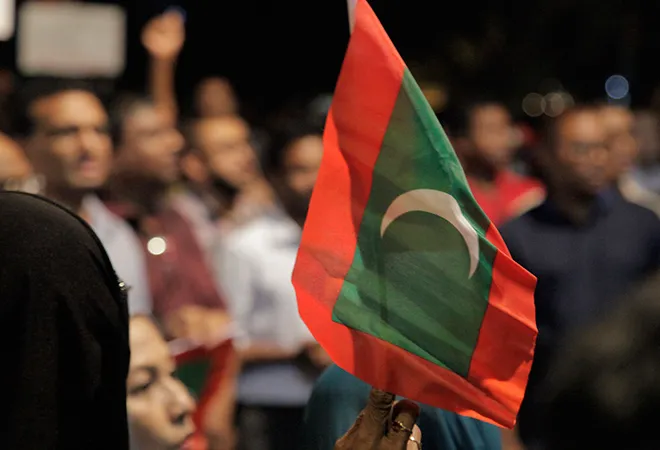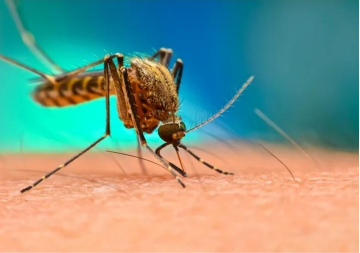
At a time when President Ibrahim Solih has rightfully claimed that the diplomatic efforts of Maldives have ‘gained global recognition’, his government is caught in an equally avoidable diplomatic embarrassment, that too involving its closest and most dependable neighbour, India. Solih’s reference came in the context of Foreign Minister Abdulla Shahid’s election as President for the 76th session of the UN General Assembly (UNGA) commencing in mid-September. In context, if it could, a note verbale days earlier from Indian High Commissioner Sunjay Sudhir, had enough to upset the Solih leadership into action—but its reaction has been timid, half-hearted and pro forma, at best.
The note cited relevant Articles of the Vienna Convention on Diplomatic Relations, 1961, on host-governments’ duty to ensure the safety and security of foreign diplomats, and sought action under the international law and also Maldivian law against ‘malicious acts’, especially by a section of the local media. The Indian concerns flowed from a local web journal which resorted to character assassination of an Indian diplomat, who has no way to defend himself or challenge the other.
Expressing concern over recent recurring articles and social media posts attacking the dignity of the High Commission and its staff by certain sections of the local media, High Commissioner Sunjay Sudhir noted in his letter to the Foreign Ministry how these attacks were motivated, malicious, and increasingly personal. “Such repeated attacks can affect the efficient performance of the functions of the High Commission and can damage the time-tested and mutually beneficial bilateral relations,” he said. They were also aimed at inciting hatred and violence against India, the High Commission, and members of its diplomatic staff, the letter further said.
The Foreign Ministry promptly issued a statement, advising the local media to respect foreign diplomats. But neither President Solih nor Foreign Minister Shahid, personally associated themselves with what remains a formal and inadequate condemnation of the local media’s defamatory statement, whose aim otherwise was to torpedo bilateral ties, that too in pursuit of targeted politico-electoral goals domestically and to reorient diplomatic relations in the bilateral and third-nation sphere.
Strengthened security
The government has since strengthened the security for the Indian High Commission, which is at a stone’s throw from the Presidential Office in capital Malé. Incidentally, security for the Chinese Embassy too has been tightened, following alleged threats of protest demonstrations outside.
The government has since strengthened the security for the Indian High Commission, which is at a stone’s throw from the Presidential Office in capital Malé. Incidentally, security for the Chinese Embassy too has been tightened, following alleged threats of protest demonstrations outside.
The Indian fears came true not long after the High Commissioner’s letter got leaked. A tweet from a fake account appeared, seeking RDX for the tweeter to blow up the Indian High Commission. No reasons were assigned. The police have since arrested the 42-year-old man and a local court has remanded him. It was an added embarrassment for Solih’s ruling Maldivian Democratic Party (MDP) as the offender turned out to be a party member.
The MDP has since sacked the arrested man from the party. Party Chief, Mohammed Nasheed, who is also the Parliament Speaker, has promptly condemned the character-attack on the Indian diplomat. Considering that the offender can be tagged as an ‘Islamist’, it may be indicative of the shape of things in the making for what is an avowed ‘secular party’ with closer governmental ties to India than China or any other nation(s).
Significantly, both the Maldives’ Journalist Association (MJA) and the Editors’ Guild have criticised the Foreign Ministry for its advice. They have already been at loggerheads with the Solih government after the Gender Ministry fined a journal for ‘insensitive reportage’ of a teenager’s murder, without going through the Maldives Media Council (MMC) and other statutory bodies, despite the Attorney-General making out a legal exception in this case. They had also taken an exception to the parliamentary panel initiating proceedings against local newspaper, Mihaaru, for reporting on sensitive security matters pertaining to Speaker Nasheed, especially so after the 6 May targeted bomb attack on him.
On the India front, the two journalist organisations have gone a step further, to question the High Commission writing directly to Rozaina Adam, Chair of the Parliamentary Committee on Independent Commissions. Joined by some religious radicals, they were critical of the latter’s directive to the MMC, the media regulatory body, to probe the media attack on the Indian diplomat without internal consultations. Rozaina has since clarified that High Commissioner Sudhir had only brought the plight of Indian diplomats to her committee’s attention, and had not suggested any particular action.
The journalists have since been supported by the political Opposition, particularly the PPM-PNC combine identified with jailed former President Abdulla Yameen, in their criticism of the Foreign Ministry and also parliamentary panel chair, Rozaina Adam. An army veteran and ex-parliamentarian, Brig-Gen Ibrahim Didi, too has taken such a position. As may be recalled, Gen Didi was a co-accused along with MDP’s Nasheed, in the ‘Judge Abdulla Kazi abduction case’, pursued by the Yameen presidency, leading to a 13-year prison term for the latter—and quashed by the Supreme Court after democracy was restored with Solih’s election in 2018.
Courting the enemy
In a significantly unsettling political move on the domestic front, Nasheed may have released, what to many Maldivians is, an evil genie out of the bottle. Having travelled to the UK for undisclosed follow-up medical treatment after those in Germany in the aftermath of the targeted bomb attack in Malé, he has sought a national referendum next year, on shifting from the presidential form of government to the (India-like) parliamentary scheme.
Nasheed, who had made the demand on President Solih through a missive that he shared with other party leaders too, made a significant and open departure, by courting for Yameen’s support for the move. He further declared his intention to contest the MDP primaries for the 2023 presidential polls, pending the fate of his demand on systems-change.
Nasheed, who had made the demand on President Solih through a missive that he shared with other party leaders too, made a significant and open departure, by courting for Yameen’s support for the move. He further declared his intention to contest the MDP primaries for the 2023 presidential polls, pending the fate of his demand on systems-change.
The latter demand comes at a time when the Solih camp has been quietly canvassing support for a second term for the incumbent, suggesting that together they can then work on a systems-change, when the COVID-induced crises were behind them, without rushing through the parliamentary scheme, which too could then end up as a failure.
Promptly, former President Maumoon Abdul Gayoom (1978-2008) was the first to oppose ‘systems change’, pointing out how the nation had overwhelmingly voted against the parliamentary scheme when he was in office and the debate was on, on the 2008 ‘democracy’ Constitution. It is anybody’s guess how the Yameen camp would react to Nasheed’s proposal, or at what cost.
The initial expectation is that for any trade-off, the Yameen camp would expect freedom for their leader, and also the withdrawal of other pending cases and investigations against him and his people. This has not gone down well with the MDP cadres and also pro-democracy supporters, who all had rallied around Nasheed for over a decade now.
The Solih camp in the MDP is yet to react to Nasheed’s revived proposal now. In what amounted to a snub at Nasheed, the last time round, the President’s office claimed that Solih having been elected by the people and individuals cannot unilaterally decide on such issues. In the larger constitutional grouping, the Solih camp retains a two-thirds majority in the MDP parliamentary party, which holds a two-thirds majority in the House, 65 out of 87.
Not every Nasheed supporter in the MDP, both cadres and others, is enthused either by his unilateral ideas, or his seeking out Yameen’s support for a referendum. They are all fed on an anti-Gayoom, anti-Yameen diet over the past decade and more, involving the two half-brothers, their shared parties and powers until the last leg of Yameen’s presidency. Party strategists, both belonging to the Solih camp and independents, too are not sure how the MDP cadres and national voters would react to Nasheed’s new proposals, now and/or the presidential poll of 2023.
Entangled issues
In this background, the media manoeuvres, whether planned or not, serve critics’ purpose of condemning the ruling MDP and the Indian neighbour after linking them in the voter’s imagination, through the commonly targeted ‘India Out’ campaign. While the visible target is India, the greater target is the MDP, and in politico-electoral terms.
With presidential polls now due in 2023, it is all only a replay of the pre-2013, anti-India, ‘GMR protests’, which cost Nasheed his presidency, until Solih’s electoral victory in 2018. As in the past, traditional social conservatism, that too off the moderate form, is getting increasingly replaced by ‘religious radicalisation’ falling short of ‘Islamic terrorism’, as in the case of the targeted bomb attack on Nasheed.
With presidential polls now due in 2023, it is all only a replay of the pre-2013, anti-India, ‘GMR protests’, which cost Nasheed his presidency, until Solih’s electoral victory in 2018. As in the past, traditional social conservatism, that too off the moderate form, is getting increasingly replaced by ‘religious radicalisation’ falling short of ‘Islamic terrorism’, as in the case of the targeted bomb attack on Nasheed.
It is in this background, Nasheed’s more recent clarification that he did not suspect the Solih Government in the bomb attack needs to be understood. Soon after the blast, his elder daughter Mira Laila, created a flutter with a tweet, blaming it on the government. Nasheed’s aunt and brother too added to the confusion by penning articles in the local media on near-similar lines.
In a bid to fish in troubled MDP waters, Opposition MP, Ahmed Shiyam, continued to insist that the Solih Government ‘cannot get’ justice for Nasheed, in the blast-probe. This was so even ahead of his PPM-PNC members in the 13-man parliamentary committee on national security, also known as the ‘241 Committee’, voting with the rest on the unanimous probe report pertaining to security issues flowing from the Nasheed bomb-attack.
The committee has held back some sensitive security-related information from the publicised report, retaining them for the eyes only of the Speaker (Nasheed himself), President Solih and the Chief Justice. The report has named Defence Minister Mariya Didi for ‘failing to carry out her duties’ after a pre-blast alert from MDP parliamentarian Ilyas Labeeb. Minister Mariya was MDP chairperson in the first part of Nasheed’s presidency a decade ago, and family has promptly demanded her resignation. Nasheed’s camp-followers in the ruling party are expected to join in. However, Nasheed’s brother Ahmed Nazim Abdul Sattar clarified that they did not say that Mariya has ‘blood on her hands’. President Solih’s reaction, if any, will be known only after the report is submitted to him, after completing the ongoing internal evaluation.
Yet, Nasheed’s posturing otherwise has only strengthened the anti-MDP groups in the country that are different in identity but have a common ‘anti-secular’ cause. So do they share a common ‘anti-India’ cause(?), too. Unintentionally, his recent statement on national referendum may have also taken the focus away from the Indian HC’s letter, and also a possible educative discourse on the Vienna Convention.
From within the government, the all-important Home Minister Sheikh Imran Abdulla, from the religion-centric Adhaalath Party, has been joining issue with the Solih leadership on matters of Islam, but without any direct confrontation or challenge. The latest is Minister Imran’s condemnation of the State-owned Islamic University of Maldives (IUM) sacking controversial religious scholar, Dr Ahmed Iyaz, after he kicked up yet another controversy by demanding ‘female genital mutilation’ (FGM) in what is still a moderate Islamic nation.
In the Opposition Yameen camp, religious conservatives and/or radicals have a common platform, if they chose to share it in electoral terms. That should be of greater concern to the MDP than to India. But then, linking them both again is Ahmed Azaan, the founder of the Dhivehi news portal Dhiyares. The English language Maldives Journal had picked its anti-India(n) drivel from sister-publication Dhiyares, and its founder now wants Maldives to dump all India-funded projects, and instead go to China for developmental funding.
Interestingly, the Chinese embassy in common neighbour Sri Lanka has been filling the gaps in the Colombo government’s thinking on Beijing-related issues, through statements, tweets, and offers of explanatory meetings with the media. Here in Malé, their embassy has maintained a mysterious silence, even after a so-called ‘radical religious’ journal has made negative linkages, by asking India to be replaced by China in funded projects. Any prize for guessing?
The views expressed above belong to the author(s). ORF research and analyses now available on Telegram! Click here to access our curated content — blogs, longforms and interviews.




 PREV
PREV


